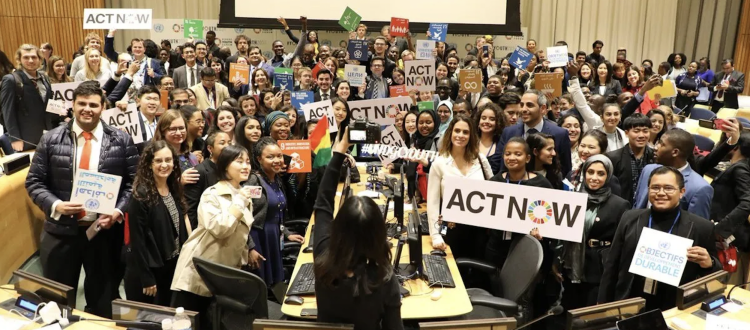ECOSOC YOUTH FORUM: THE YOUTH INVOLVED ON CLIMATE AND THE 2030 AGENDA
The importance of the voice of the youth and very youth in the fight against climate inaction is stirring the consciences of many. However, there is no doubt that these voices are not always taken into account at the highest levels of decision-making processes.
At the ECOSOC Youth Forum, the aim was precisely to counter this trend and to open dialogue forums to provide a space for the young minds to share their ideas, but above all to talk about the inclusion of young people in governmental decision-making processes and strategies through which their involvement can take place. In addition, it was an opportunity to talk about human rights, youth unemployment, sustainable development, schooling and not least the role of technology and funding in relation to these issues. Those are challenges of absolute urgency, if we consider them represented in a global framework where the climate crisis seems to be defining and limiting the time available to act concretely and effectively for the new generations and those currently inhabiting this planet. The Forum therefore created an opportunity to reflect on the innovative approach of young people towards the goals of the 2030 Agenda and brought government leaders and representatives of youth associations to the same table.
The ECOSOC Youth Forum was organised by the Presidency of the United Nations Economic and Social Council (ECOSOC) with the support of the United Nations Department of Economic and Social Affairs (DESA). The opening session also presented the Youth 2030 Progress Report, which emphasises that over time, from 2018 till now, the presence and inclusion of young people in decision-making processes and at governmental tables is increasing.
WHAT WAS THE AGENDA AND WITH WHICH RESULTS
The plenary session that opened the Forum entitled “Working with and for youth in the post-COVID-19 re-construction and achieving the 2030 Agenda goals” was dedicated to strategies to “re-construct” society and the planet with youth in the post-Covid era. This was to give a strong and clear message on the importance and opportunity of re-constructing the social and environmental equilibria changed by Covid-19, re-launching action for sustainable development and climate action in a political landscape that considers, listens to and ‘uses’ young people in this process of re-construction (build back) as a source and inspiration. The thematic sessions on the first day focused on the four main goals of the UN 2030 Agenda: Goal 4 ‘education’, Goal 5 ‘gender equality’, Goal 14 ‘life below sea level’ and Goal 15 ‘life on land’. While the afternoon continued with thematic sessions on ‘Build Back Better’ associated with the role of women, youth and environmental organisations and the role of education.
On the second day, the morning opened with the first session of events divided by geographical areas. The areas represented were Asia and the Pacific, the region of the Arab states, Africa, Latin America, the Caribbean and finally Europe, North America and the other states. The morning dedicated to regional events was followed by an afternoon of plenary sessions devoted directly to the voices of young people. Indeed, although the regional sessions in the morning focused more on speeches by heads of state and government, the afternoon plenary sessions were intended as a forum for listening to representatives of the younger generation and their ideas. For example, the first afternoon session, ‘Financing our Future – Agenda 2030 Goal 17’, was about promoting socially and environmentally responsible investments that take into account the needs of the younger generation and changing an outdated economic model to one that can cushion and predict future shocks. In practice, a more resilient economic and financial investment model to safeguard present and future generations. In the same session, innovation and digital infrastructure were also discussed. The topic of structuring and utilising data, knowledge and research produced by young women and men was highly topical and extremely concrete. This, in order to strengthen research and the inclusion of young people in programs to inform political actors about environmental and climate issues and policies. In any case, the main objective of this session was understanding how current international and national instruments can have more impact on young people and increase the opportunities young people have to actively interact on the formulation and implementation of financial policies to advance the goals of the 2030 Agenda on Sustainable Development.
The human and professional calibre of the moderators, young representatives of the present associations, scholars and private sector representatives at the event was worthy of a major international forum. The remote format gave even more voices the opportunity to be heard and to reach with their echo parts of the planet that very often find it difficult to be heard. What is also remarkable is the way in which the event was organised. It was decided to give much more space to moments of dialogue, sharing and discussion among the participants rather than a mere ‘one-way’ presentation by them, which is very often the case during events of this size organised virtually. In this regard, the platform created ad hoc for the creation and sharing of content on social media allowed numerous participants to network, to share their experience during the event and to feel part of a space for dialogue, despite the online version.
The event was more than just a listening forum where international and national actors interacted with young voices. It was, due to its structure, global participation and institutional support, a true message of transformation. Active transformation towards a model never considered before, but fundamental for present and future existence, a model that sees accountable past generations collaborating with present generations. These generations are emotionally and professionally prepared to face a turning point of such importance and centrality, which will benefit the whole of humanity.
Article by Cecilia Consalvo, Italian Climate Network Volunteer

